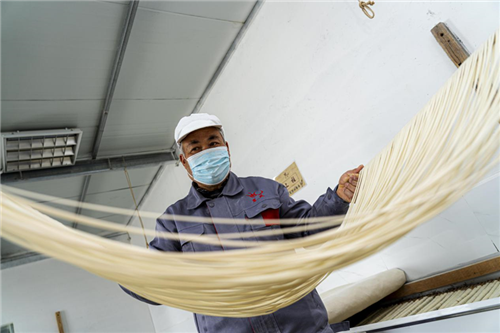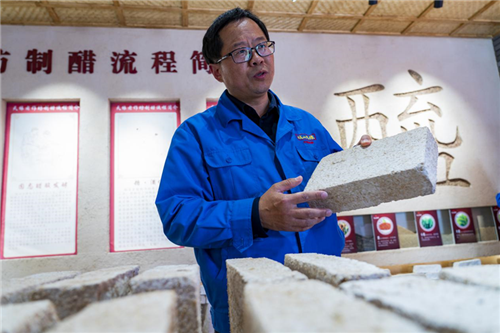Qishan county of Shaanxi province proposed to expand its "bowl of noodles" economy in recent years to further promote the improvement of agricultural quality and efficiency.
The implementation of the "bowl of noodles" strategy, through leading enterprises to drive the industrial chain, characteristic products to enhance the value chain and e-commerce logistics to link up the supply chain, is expected to promote the Qishan saozi noodle brand and lead to its industrialization and marketization. Once initial results are achieved, hopes are that this local cuisine will be the foundation of a modern industry.
Qishan is the birthplace of Zhou Dynasty (c.11th century-256 BC) culture. One of its inheritances is an ancient delicacy, Qishan saozi noodles. It has always been the dream of Qishan people to let more outlander know about this delicious food.
According to Zhang Xiaoyu, director of the Agriculture and Rural Bureau of Qishan County, the county takes the "bowl of noodles" economy as the key to leading rural revitalization, adheres to the two-project drive of "saozi noodles" and "Ganmianpi", two kinds of local characteristic cooked wheaten food, and intends to deeply integrate the primary, secondary and tertiary industries and speed up the development of the whole industrial chain.
In 2020, the economic output value of "a bowl of noodles" reached 13 billion yuan, Zhang said.

A worker in the elaborate production of Qishan saozi noodles raw materials, hollow noodles. [Photo provided to chinadaily.com.cn]
Making Qishan hollow noodles is a unique craft, the product of the combination of thousands of years of traditional handicrafts and a modern scientific formula. It has a history of more than 3,000 years. It represents the development of the traditional handicraft industry of the Chinese nation, as well as the important role of saozi noodles in the Qishan "bowl noodle" economy.
In the new production workshop of Meiyang Folk Food Co., Ltd, Yu Hong introduced Meiyang's new equipment, saying that with the help of modern production equipment, her enterprise can produce 40,000 pieces of Ganmianpi every day. The new production capacity will make up for any shortages of the food and allow the authentic food to be disbursed across the whole country.

Han Yonghong, vice president of Qishan Tianyuan Food Co., Ltd, introduces their product, vinegar powder.[Photo provided to chinadaily.com.cn]
The Tianyuan vinegar industry is the largest vinegar making enterprise in Shaanxi province, and also a star enterprise in Qishan. Tianyuan vinegar is quite famous in Shaanxi province. At present, the annual production capacity of the enterprise is 60,000 tons, and the output value is 100 million yuan.
Han Yonghong, vice president of Qishan Tianyuan Food Co., said that at present, 5,000 tons of wheat bran and 3,000 tons of wheat and corn are consumed in the production of the vinegar, and 90 percent of the raw materials can be purchased locally.
"In addition, we have also established a high-quality grain production base of 1,100 mu in Qishan, which aims to promote the standardization of agricultural planting in Qishan through our high-quality construction guidance. We need to develop a bowl of noodles economy to turn Qishan's grain into vinegar for better economic benefits," Han said.

A worker in Baoji Deyoulin Food Co., Ltd displays the product of chili sauce made by the company.[Photo provided to chinadaily.com.cn]
Baoji Deyoulin Food Co., Ltd is a deep processing pepper enterprise based on Baoji pepper, a national geographic indication protection product, and has been designated by Qishan County Agricultural Bureau as a pepper supply base for Qishan saozi noodles.
Lu Huaili, manager of Baoji Deyoulin Food Co., Ltd, said that Deyoulin has a 10,000-mu Baoji pepper planting base, and has developed more than 20 kinds of products, including pepper powder, spicy oil and Qishan saozi noodles concentrated soup. At present, the investment scale of the enterprise is 35 million yuan, the annual production capacity is 2,000 tons, and the low-temperature storage capacity of raw materials is 1,500 tons.
Hot pepper is an indispensable part of Qishan Ganmianpi and Qishan saozi noodles, Lu said, and is a necessity in the enlargement and strengthening of the bowl of noodles economy. Deyoulin actively cooperates with the agricultural cooperatives established in surrounding villages and towns to cultivate pepper, providing 2,000 jobs around the area. The enterprises use those actual benefits to encourage local farmers to plant pepper.

